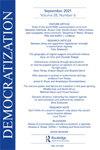学术自由与专制的开始
IF 2.9
1区 社会学
Q1 POLITICAL SCIENCE
引用次数: 0
摘要
摘要民主在全球范围内受到威胁,第三波专制化表现为民主倒退和专制强化。然而,尽管大学一直是重要的民主温床,但学术自由和专制之间的关系很少引起学术界的关注。本文首次系统地研究了学术自由对专制开始的影响。特别是,它揭示了学术自由如何保护政权免受专制化的影响,并认为更多的学术自由通过在学生和研究人员身上留下亲民主的偏见来降低专制化的风险。本文的研究设计结合了两项研究。研究I测试了在更大的学术自由下社会化的毕业生是否会得到更民主的支持,我使用世界价值观调查和线性固定效应模型的数据进行了分析。研究II使用V-Dem数据和二项响应GLM测试了更多的学术自由是否会降低专制化的发生概率。这篇文章发现有证据表明,虽然高水平的学术自由会降低专制化开始的概率,但低水平的学术也会降低独裁化开始的可能性。总的来说,这篇文章强调了学术自由对民主的关键作用,尤其是在民主受到严重威胁的时候。本文章由计算机程序翻译,如有差异,请以英文原文为准。
Academic freedom and the onset of autocratization
ABSTRACT Democracy is under threat across the globe and a third wave of autocratization manifests in democratic regression and authoritarian hardening. However, although universities have been important pro-democracy hotbeds, the nexus between academic freedom and autocratization has generated little scholarly attention. This article presents the first systematic investigation of the influence of academic freedom on the onset of autocratization. In particular, it reveals how academic freedom protects regimes from an onset of autocratization and argues that more academic freedom reduces the risk of autocratization by imprinting a pro-democracy bias on students and researchers. This article’s research design combines two studies. Study I tests whether graduates that were socialized under more academic freedom develop more democratic support, which I analyse using data from the World Values Surveys and linear fixed effects models. Study II tests whether more academic freedom reduces the onset probability of autocratization using V-Dem data and binomial-response GLMs. This article finds evidence that while high levels of academic freedom reduce the probability of an onset of autocratization, low levels also reduce the probability of an onset. Overall, the article highlights the crucial role of academic freedom for democracy, especially in times of severe threats to democracy.
求助全文
通过发布文献求助,成功后即可免费获取论文全文。
去求助
来源期刊

Democratization
POLITICAL SCIENCE-
CiteScore
6.40
自引率
12.50%
发文量
73
期刊介绍:
Democratization aims to promote a better understanding of democratization - defined as the way democratic norms, institutions and practices evolve and are disseminated both within and across national and cultural boundaries. While the focus is on democratization viewed as a process, the journal also builds on the enduring interest in democracy itself and its analysis. The emphasis is contemporary and the approach comparative, with the publication of scholarly contributions about those areas where democratization is currently attracting considerable attention world-wide.
 求助内容:
求助内容: 应助结果提醒方式:
应助结果提醒方式:


